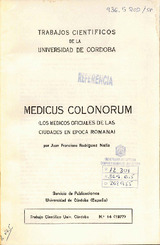Mostrar el registro sencillo del ítem
Medicus Colonorum: (los médicos oficiales de las ciudades en época romana)
| dc.contributor.author | Rodríguez Neila, Juan Francisco | es_ES |
| dc.date.accessioned | 2011-10-26T11:17:53Z | |
| dc.date.available | 2011-10-26T11:17:53Z | |
| dc.date.issued | 1977 | |
| dc.identifier.uri | http://hdl.handle.net/10396/5836 | |
| dc.description.abstract | This work is going to expose which was the situation of the official doctors which was contracted for the towns in the Roman Empire. We are starting of a short exposition about the known precedings in the classical Greece, in where the mentality respect to the Medicine there is very much opened, in contrast to the distrust that Rome maintained with the first persons which exercise such profession, mainly Greeks. These Greek persons abounded enough since the I. B. C. century, the most part of the such persons were over all slaves and freedmen. During the year 46 B. C., Caesar gave the Roman citizenship lo stranger doctors who was established in the imperial capital. It was going to mean the beginning of a general attitude very much favourable towards such profession persons of the Aesculapian’s art, t ill point that some Romans began to exercise as such. Since the first imperial centuries, there are very numerous legal dispositions directed to defend them, specially to those whom the state contracted for his service. In imitation of this, the towns had soon public municipal doctors, which there are existing since several centuries before in Greece, although they hadn't a so definied and completed statute as they had now. The doctor has been always a man of anxious and travelling spirit, on account of it, sometimes, when he was needed for someone, they wasn't available. From that it follows that the creation of these corporations of the official doctors, having fixed residence, it is was a necessity (the term which designated them, it was as medicus or archiatrus). The quota of the municipal doctors was fixed in the law according the category of the towns. However, the selection corresponded to the local curiae, which extended the necessary permission to exercise the profession, and it were going to establish the corresponding salary, as well as of several privileges. Also there are exposed in the present work some epigraphic testimonies about such official doctors, whose professional condition was going to raise along of the Roman Empire, according they were valued each time more the liberal arts, inside of which there is the Medecine. Since the regularization of his situation, there are demanding them more responsibility, increasing, parallely, his professionalism, which aspects always attended in the roman law. Other question is about his gains. A times, someone reunited great fortunes, but they constituted one exception, because the payment of his services was generally scarce, however if we think that there was fixed nobody to the respect. Only, who were contracted for the towns, they enjoyed about a salary, which were increasing during the long time. As well as, they got many privileges. Augustus concedes them at once the tributary immunity, and along of time of empire, several imperial constitutions added news benefits, which became hereditary. | en |
| dc.format.mimetype | application/pdf | es_ES |
| dc.language.iso | spa | es_ES |
| dc.publisher | Universidad de Córdoba, Servicio de Publicaciones | es_ES |
| dc.rights | https://creativecommons.org/licenses/by-nc-nd/4.0/ | es_ES |
| dc.source | Trabajos Científicos Universidad de Córdoba 14 (1977) | es_ES |
| dc.subject | Medicina | es_ES |
| dc.subject | Imperio Romano | es_ES |
| dc.title | Medicus Colonorum: (los médicos oficiales de las ciudades en época romana) | es_ES |
| dc.type | info:eu-repo/semantics/article | es_ES |
| dc.rights.accessRights | info:eu-repo/semantics/openAccess |

